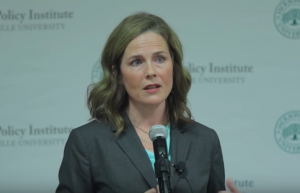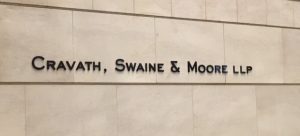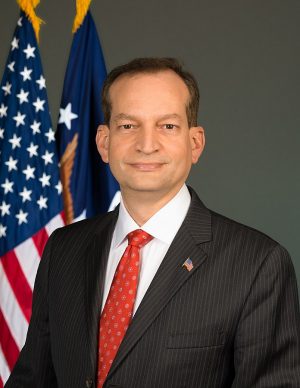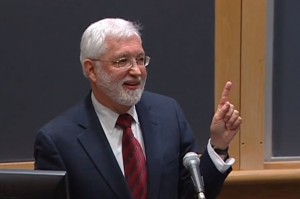SCOTUS
-
 Non-Sequiturs
Non-SequitursNon Sequiturs: 03.31.19
* Even Jonathan Adler, no fan of Obamacare, can’t support the Justice Department’s shift of position in the ongoing Affordable Care Act litigation out of Texas. [Volokh Conspiracy / Reason]
* John Lauro continues to protect the reputation of his client Wendi Adelson, ex-wife of murdered law professor Dan Markel. [2paragraphs]
* Meanwhile, another player in the Dan Markel case — David Oscar Markus, counsel to Charlie Adelson — argues that Attorney General William Barr and Deputy Attorney General Rod Rosenstein made the right call on obstruction of justice. [The Hill]
* Speaking of the Mueller investigation, Brianne Gorod points out that Congress has the power to ask the district court to release grand jury transcripts and related information from the case. [Take Care]
* Whether or not you agree with Senator Marco Rubio’s proposed constitutional amendment to fix the size of the U.S. Supreme Court at nine justices, it’s not a bad idea to think about possible ways to restructure SCOTUS — as Gordon Renneisen does here. [Law360]
* Meanwhile, as the Court grapples with the cross-shaped war memorial case this Term, Rick Garnett wonders: can a liberal state favor one religion over others? [First Things via PrawfsBlawg]
* Legal tech M&A activity continues apace, with vLex’s acquisition of Justis. [Artificial Lawyer]
-
 Courts
CourtsArguing Before SCOTUS: An Advocate's Perspective
What's it like to argue before the Supreme Court of the United States? A leading high-court advocate offers insights and tips.  Sponsored
SponsoredLegal AI: 3 Steps Law Firms Should Take Now
If 2023 introduced legal professionals to generative AI, then 2024 will be when law firms start adapting to utilize it. Things are moving fast, so…-
 Non-Sequiturs
Non-SequitursNon Sequiturs: 03.24.19
* In the wake of Justice Anthony M. Kennedy’s retirement, I predicted that Chief Justice John Roberts, a staunch institutionalist when it comes to the Supreme Court, would serve as a moderating influence at SCOTUS — and so far that seems to be the case, with Adam Feldman noting a “a mild liberalizing over time” in JGR’s jurisprudence. [Empirical SCOTUS]
* Speaking of SCOTUS, it’s high time for the Court to resolve the messy circuit split on email privacy under the Stored Communications Act, according to Orin Kerr. [Volokh Conspiracy / Reason]
* The Trump Administration’s new executive order about free speech on university campuses might harm rather than help the cause of academic freedom, as Paul Horwitz points out. [PrawfsBlawg]
* Republicans aren’t the only ones with purity tests for judicial nominations; Demand Justice, a left-wing group focused on the federal judiciary, has high standards for Democratic opposition to Trump nominees. [Bench Memos / National Review]
* While you wait for the 2019 edition of Above the Law’s law school rankings, check out the latest installment of the “revealed preferences” law school rankings, by C.J. Ryan and Brian L. Frye. [SSRN]
* What’s next for Kira Systems, a leader in the world of legal AI? Co-founder and CEO Noah Waisberg isn’t resting on his laurels — and he’s putting that $50 million investment from last September to work. [Artificial Lawyer]
* Fastcase continues to forge new partnerships — and in its latest alliance, it will give its subscribers access to select titles from the American Bar Association (which, full disclosure, published my book (affiliate link) in 2014). [Dewey B Strategic]
* If you’ll be in New York this coming Wednesday, consider attending the inaugural Kenneth P. Thompson ’92 Lecture on Race and Criminal Justice Reform at NYU Law School, focused on wrongful convictions and the roles of prosecutors and others in the criminal justice system. [NYU Law]
-
 Non-Sequiturs
Non-SequitursNon Sequiturs: 03.17.19
* With Justice Anthony M. Kennedy off the Supreme Court, who has replaced him as the justice most often in the majority? The answer might surprise you (but note that this is based on only part of the Term). [Empirical SCOTUS]
* Speaking of SCOTUS, what does its recent copyright ruling in Fourth Estate v. Wall-Street.com mean for creators? Here’s a clear and concise breakdown. [All Rights Reserved]
* In the wake of the giant college admissions scandal, is it time to rethink how elite institutions admit their students? David Orentlicher offers this proposal for reform. [PrawfsBlawg]
* Joel Cohen suggests that perhaps Ty Cobb should have kept his praise of Robert Mueller to himself. [The Hill]
* What’s the state of U.S. Philippines relations, including the 1951 Mutual Defense Treaty, in light of expanding Chinese influence in southeast Asia? It’s complicated, according to Mark Nevitt. [Just Security]
* How has the judicial confirmation process changed under President Donald Trump? Pretty significantly, as Thomas Jipping explains. [Bench Memos / National Review]
* Congratulations to the latest winner of the Joseph Story Award, Professor Samuel Bray — who delivered an acceptance speech that’s well worth your time. [Volokh Conspiracy / Reason]
* Is a federal law that prohibits federal agencies from using equipment from the controversial Chinese company Huawei an unconstitutional Bill of Attainder? Easha Anand, Charlie Gerstein, and Jason Harrow tackle this question, and more, in the latest episode of Versus Trump. [Versus Trump via Take Care]
-
 Non-Sequiturs
Non-SequitursNon Sequiturs: 03.10.19
* “I Thought I Could Be A Christian And Constitutionalist At Yale Law School. I Was Wrong.” So writes Aaron Haviland, a 3L at Yale Law School. [The Federalist]
* But if you can survive YLS as a conservative, you might thrive in the world beyond — just ask Senator Josh Hawley (R-Mo.), who’s now a powerful voice on judicial nominations. [Bench Memos / National Review]
* How often does the Notorious RBG see a brief citing the Notorious BIG? Check out this fun read, filed in the Supreme Court on behalf of a constellation of hip-hop stars represented by Alex Spiro and Ellyde Thompson of Quinn Emanuel. [Supreme Court of the United States via New York Times]
* Yes, I’ve been on a hiatus from Twitter — and maybe I’m on to something, if you agree with Stephen Cooper. [Spectator]
* “For your information,” Georgia trial judges, “the Supreme Court has roundly rejected prior restraint.” [Volokh Conspiracy / Reason]
* Retired Judge Nancy Gertner (D. Mass.) believes that U.S. sentencing needs reform — but Paul Manafort’s case is far from the ideal vehicle for it. [Washington Post]
* Congratulations to Fastcase on its latest alliance, this time with credit-reporting giant TransUnion. [Dewey B Strategic]
* And congrats to Neota Logic on its new Dashboard feature, which sounds nifty. [Artificial Lawyer]
-
 Non-Sequiturs
Non-SequitursNon Sequiturs: 03.03.19
* Several weeks after its release, Over My Dead Body, Wondery’s new podcast exploring the Dan Markel case, continues to top the podcast charts — and creators Matthew Shaer and Eric Benson have some thoughts on why the case has seized the public imagination. [Inside Edition]
* The Keith Tharpe case, far from representing an isolated injustice, reflects and embodies the racist roots of the death penalty in America, according to Stephen Cooper. [CounterPunch]
* The fight against racism in the justice system has been going on (and will continue) for many years — and as Texas lawyer John Browning has discovered, trailblazing African American attorneys were fighting to integrate the bar of the Lone Star State as early as the 1800s. [Texas Lawyer]
* I’ve previously argued against treating blue slips as senatorial vetoes of judicial nominees, based on their consequences for the federal judiciary — and as Thomas Jipping points out, history supports treating blue slips as a senatorial courtesy, nothing more. [Bench Memos / National Review]
* Don’t be fooled by the high level of unanimity in the Supreme Court’s first few decisions of the Term; greater disagreement lurks in the “shadow docket,” as Adam Feldman explains. [Empirical SCOTUS]
* The compromise appropriations bill that saved us from another government shutdown could also advance the Trump Administration’s “remain in Mexico” policy for asylum seekers from Central America — which Stewart Baker believes “may offer a better solution to the immigration crisis than the construction of a few miles of new wall.” [Lawfare via Volokh Conspiracy / Reason]
* Actor James Woods is out of the woods in a defamation lawsuit arising out of an erroneous tweet of his, thanks to this interesting ruling by the Sixth Circuit. [How Appealing]
* Jean O’Grady is excited about Panoramic, the latest offering from Thomson Reuters, which transforms “the ambitious idea of merging workflow and billing into an actual product.” [Dewey B Strategic]
-
 Non-Sequiturs
Non-SequitursNon Sequiturs: 02.24.19
* You wouldn’t want to be in the shoes of Jussie Smollett right now — nor the shoes of his lawyers, according to Joel Cohen and Dale Degenshein. [Law and Crime]
* And in other celebrity legal news, the new documentary about Drake has triggered a slew of copyright claims and takedown notices. [All Rights Reserved]
* If you’ve been listening to the compelling new podcast from Wondery about the Dan Markel case, check out this interesting interview with host Matt Shaer. [Uproxx]
* Speaking of podcasts, I recently appeared on Miranda Warnings, the popular podcast by former New York State Bar Association president David Miranda, to talk about Biglaw, legal education, and more. [Miranda Warnings]
* And if you’ll be in Nashville tomorrow or Tuesday, please feel free to stop by either or both of the talks I’ll be giving at Vanderbilt — one on judicial celebrity, and one on the state of legal education. [Vanderbilt Federalist Society / Vanderbilt Law School Library]
* If you’re a libertarian or otherwise concerned about excessive exercises of government power, you should be concerned about President Donald Trump’s invocation of emergency powers, as Ilya Somin explains. [Volokh Conspiracy / Reason]
* Will the Supreme Court ride to Trump’s rescue if and when his national emergency declaration winds up before SCOTUS? Brianne Gorod has her doubts. [Take Care]
* More excellent advice from expert courtroom lawyer David Berg — think of this as “The Trial Lawyer: What It Takes To Lose.” [YouTube]
-
 Non-Sequiturs
Non-SequitursNon Sequiturs: 02.17.19
* I share Allahpundit’s take on the retirement buzz around Justice Clarence Thomas (recently discussed by Jeffrey Toobin, but also in the air at last November’s Federalist Society conference): it’s certainly possible, and if it happens, Judge Amy Coney Barrett and Judge Amul Thapar are the two top picks. [Hot Air]
* And Judge Barrett is protecting her prospects for Supreme Court confirmation: she just joined the opinion of a fellow shortlister, Judge Diane Sykes, that dutifully applies Hill v. Colorado, the shaky but not-overruled Supreme Court precedent about free-speech rights outside abortion clinics. [Bench Memos / National Review]
* Speaking of SCOTUS, which amici boast the best track recorders in filing certiorari-stage amicus briefs in business cases? Adam Feldman crunches the numbers — and the dominance of the U.S. Chamber of Commerce should come as no surprise. [Empirical SCOTUS]
* And speaking of the Chamber, it also seems to be making progress on its goal of forcing more disclosure of litigation-funding arrangements, with the reintroduction of the Litigation Funding Transparency Act (LFTA). [Institute for Legal Reform]
* Litigation funders don’t reflexively oppose any and all disclosure requirements; Michael German of Vannin Capital, for example, argues for a sensible and limited disclosure regime. [New York Law Journal]
* If you’re looking for an interesting new podcast (besides Wondery’s exploration of the Dan Markel case), consider Bound by Oath from the Institute for Justice (Eugene Volokh is a fan). [Institute for Justice]
* Should Roger Stone be gagged? Joel Cohen weighs the pros and cons. [The Hill]
* Are you a lawyer who enjoys poker? Mark your calendar for February 23! [Attorney Poker Tour]
 Sponsored
SponsoredNavigating Financial Success by Avoiding Common Pitfalls and Maximizing Firm Performance
In this CLE-eligible webinar, we’ll explore the most common accounting pitfalls and how to avoid them for your firm.-
 Non-Sequiturs
Non-SequitursNon Sequiturs: 02.10.19
* Irina Manta, a recent addition to the roster of Volokh Conspirators, assesses some of the attacks leveled against D.C. Circuit nominee Neomi Rao. [Volokh Conspiracy / Reason]
* In other nomination news, Thomas Jipping explains why conservatives should temper their excitement over those 44 judicial nominees who just got reported out of the Senate Judiciary Committee. [Bench Memos / National Review]
* Michael Dorf’s take on Chief Justice John Roberts joining the four liberals on the Supreme Court to put the Louisiana abortion law on hold: the right to an abortion is “not in quite as much immediate danger as one might have thought. And that’s not nothing.” [Take Care]
* Lawyer to the stars Alex Spiro, partner at Quinn Emanuel, talks about how he’s approaching the representation of his latest celebrity client, rapper 21 Savage. [Complex]
* On the occasion of his 15th blogiversary (congratulations!), Rick Garnett reflects on the past and future of blogging. [Mirror of Justice via PrawfsBlawg]
* Jean O’Grady chats with Pablo Arredondo of Casetext about the platform’s newest features. [Dewey B Strategic]
* And in other legal technology news, congrats to legal AI innovator Luminance on securing another $10 million in funding (reflecting a total valuation for the company of $100 million). [Artificial Lawyer]
* Last Thursday, Alabama executed Domineque Hakim Marcelle Ray and did not allow his imam to be present (even though Christian inmates can have the prison chaplain present) — a manifest injustice, according to Stephen Cooper. [Alabama Political Reporter]
* In the latest installment of his ongoing series offering advice to trial lawyers, David Berg sets forth an essential rule of cross-examination. [YouTube]
-
 Non-Sequiturs
Non-SequitursNon Sequiturs: 02.03.19
* How have personnel changes at the Supreme Court affected the dynamics at oral argument? Adam Feldman offers this analysis. [Empirical SCOTUS]
* Ed Whelan expresses relief over the White House’s new slate of Ninth Circuit nominations. [Bench Memos / National Review]
* Can President Trump declare a “national emergency” in order to build his beloved wall? The National Emergencies Act is not a blank check, according to Brianne Gorod. [Take Care]
* Should Congress pass a “deepfakes” law? Orin Kerr has some concerns. [Volokh Conspiracy / Reason]
* What’s going on with Rudy Giuliani? Joel Cohen has a theory. [The Hill]
* Jean O’Grady is pleased to see all the competition in the legal analytics space (with Precedent Analytics from Thomson Reuters as the newest entrant) — but she’d like to see more support for the competing claims of the different products. [Dewey B Strategic]
* News organizations need stricter and better guidelines when interviewing mentally ill defendants, according to former public defender Stephen Cooper. [The Tennessean]
* Have questions about the fast-approaching February bar exam? Ashley Heidemann has answers. [JD Advising]
-
 Non-Sequiturs
Non-SequitursNon Sequiturs: 01.20.19
* Adam Feldman explores the possible effect on the Supreme Court of replacing Justice Ruth Bader Ginsburg with a staunch conservative — e.g., Judge Amy Coney Barrett. [Empirical SCOTUS]
* Speaking of SCOTUS, here’s Ilya Somin’s read of the tea leaves in Knick v. Township of Scott, an important Takings Clause case. [Volokh Conspiracy / Reason]
* Stephen Embry disagrees with Joe Patrice’s suggestion that junior lawyers are going extinct, but Embry acknowledges the major effect that technology is having, and will continue to have, on legal practice and employment. [TechLaw Crossroads]
* Charles Glasser looks at what might have caused the political polarization of the modern media and its consumers. [Daily Caller]
* The prospect of Michael Cohen testifying publicly before Congress is making some people giddy — but it’s not without its downsides, as Joel Cohen explains. [The Hill]
* What can we learn from official Washington utterances about the shutdown? Here’s some intel from VoxGov, via Jean O’Grady. [Dewey B Strategic]
* Not all provisions of the Bill of Rights are created equal, according to Gerard Magliocca. [PrawfsBlawg]
* David Berg draws lessons for trial lawyers from the genius of Joe Jamail’s use of hypothetical questions. [YouTube]
-
 Non-Sequiturs
Non-SequitursNon Sequiturs: 01.13.19
* A happy 200th birthday to Cravath, which celebrates its bicentennial in 2019 (and which has launched a sharp-looking, historically rich microsite for the occasion). [Cravath/200]
* According to Dayvon Love, “the policy response from mainstream political institutions and the Democratic Leadership in Maryland to the issue of gun violence and homicide in the Black community is mired in racism.” [Leaders of a Beautiful Struggle]
* The current Term of the Supreme Court doesn’t boast many blockbusters — but some cases are more interesting than others, as Adam Feldman points out. [Empirical SCOTUS]
* Illegal aliens, guns, and strict liability, oh my! Eugene Volokh breaks down Rehaif v. United States, which SCOTUS just agreed to hear. [Volokh Conspiracy / Reason]
* The Supreme Court has taken an increased interest in intellectual property in recent years — and if it wants to tackle issues of copyright infringement in the digital age, Capitol Records v. ReDigi could be a good vehicle. [All Rights Reserved]
* Speaking of supreme courts, Florida’s is likely to shift rightward, as Ed Whelan explains. [Bench Memos / National Review]
* If you’re getting lots of questions from friends and family about the constitutional law of shutdowns, check out this helpful explainer from Zachary Price. [Take Care]
* And if you have thoughts on what legal publishers got right and wrong in 2018, Jean O’Grady would like to hear from you. [Dewey B Strategic]
-
 Non-Sequiturs
Non-SequitursNon Sequiturs: 01.06.19
* It’s baaack: partisan gerrymandering returns to the Supreme Court — and in the view of veteran SCOTUS watcher Amy Howe, it’s unlikely that the justices will duck the merits this time around. [SCOTUSblog]
* Article III standing and the Stored Communications Act: Orin Kerr argues that it should be viewed through the lens of property rather than privacy. [Volokh Conspiracy / Reason]
* Carrie Severino calls out Senate Democrats for their persistent — and in her view, unjustified — questioning of judicial nominees about their religious views and affiliations. [Bench Memos / National Review]
* Joel Cohen identifies an interesting issue: should a defendant prejudiced by government misconduct in a case receive a break at sentencing? [Law & Crime]
* Here are some highlights from Chief Justice John Roberts’s year-end report on the federal judiciary, courtesy of Howard Wasserman. [PrawfsBlawg]
* The new year is a time of beginnings — and endings. Concurring Opinions, you will be missed. [Concurring Opinions]
Sponsored

Legal AI: 3 Steps Law Firms Should Take Now

The Business Case For AI At Your Law Firm


Early Adopters Of Legal AI Gaining Competitive Edge In Marketplace
Sponsored

Navigating Financial Success by Avoiding Common Pitfalls and Maximizing Firm Performance

Is The Future Of Law Distributed? Lessons From The Tech Adoption Curve
-
 Non-Sequiturs
Non-SequitursNon Sequiturs: 12.30.18
* In 2018, what did Donald Trump talk about when he talked about the courts? Adam Feldman dives into the data to find out. [Empirical SCOTUS]
* Speaking of President Trump and the judiciary, he continues to appoint federal judges at a record pace — but the Democrats are doing everything they can to slow down his progress. [Bench Memos / National Review]
* If you care at all about affordable housing, then you should be heartened by these developments in the fight against exclusionary zoning, as discussed by Ilya Somin. [Volokh Conspiracy / Reason]
* Congratulations to the Department of Justice on its ninth consecutive year of civil health care fraud settlements and judgments exceeding $2 billion. [MedCity News]
* If you’re interested in the hot topics among law librarians, legal technologists, and others in the space, check out Jean O’Grady’s most popular stories of 2018. [Dewey B Strategic]
* And if you’re interested in the year that was in artificial intelligence and the law, check out the Artificial Lawyer’s roundup of notable news. [Artificial Lawyer]
* Condolences to the friends, family, and colleagues of Bre Payton, who passed away last week at the age of 26. [The Federalist]
* Veteran trial lawyer David Berg continues his series on “What It Takes To Win.” [YouTube]
-
 Non-Sequiturs
Non-SequitursNon Sequiturs: 12.16.18
* In case you missed it (the news broke on Friday night), Judge Reed O’Connor (N.D. Tex.) held that the Affordable Care Act aka Obamacare is unconstitutional, in the wake of last year’s tax reform that reduced the ACA’s “shared responsibility payment” for lacking health-care coverage to zero. [MedCity News]
* Josh Blackman agrees with Judge O’Connor the constitutionality of the individual mandate, but disagreed with his severability analysis. [Reason / Volokh Conspiracy]
* Meanwhile, fellow Volokh Conspirator Samuel Bray is glad that the court didn’t issue a national injunction. [Reason / Volokh Conspiracy]
* Adam Feldman takes a closer look at the Federal Circuit’s relationship to the Supreme Court — including which members of the Federal Circuit are most frequently vindicated by SCOTUS. [Empirical SCOTUS]
* Carrie Severino shares the disappointment of her former boss, Justice Thomas, in Chief Justice Roberts and Justice Kavanaugh voting against certiorari in Gee v. Planned Parenthood of Gulf Coast. [Bench Memos / National Review]
* Eric Turkewitz calls out members of the media for misreporting on a routine trip-and-fall case because they don’t like the plaintiff’s famous father. [New York Personal Injury Law Blog]
* Oakland is going on the offensive against the NFL, firing off a 49-page complaint signed by James Quinn of Berg & Androphy, among others. [The MMQB / Sports Illustrated]
* Speaking of Berg & Androphy, name partner David Berg offers expert insights on what it takes to win as a trial lawyer. [YouTube]
-
 Non-Sequiturs
Non-SequitursNon Sequiturs: 12.09.18
* A fantasy from the fevered imagination of Lawprofblawg: playing the role of the Grinch who stole meetings. [Lawprofblawg]
* Joel Cohen wonders: should jurors be instructed about the possible inaccuracy of descriptions of forensic evidence in “cop show” television programs? [Law and Crime]
* David Oscar Markus isn’t afraid to take on tough cases — like defending embattled Secretary Alex Acosta in the court of public opinion. [Miami Herald via SDFLA Blog]
* Former federal defender Stephen Cooper does not mince words: “The prospective gassing of human beings in Alabama is an abomination.” [Alabama Political Reporter]
* Jerry Goldfeder and Lincoln Mitchell offer up this hypothetical (which sounds far-fetched, but never say never given the times in which we live): “What if Trump loses but refuses to leave the White House?” [New York Daily News]
* Looking for a special present for the legal nerd in your life? In addition to the items featured in the Above the Law holiday gift guide, check out the latest edition of the Solicitor General’s Style Guide. [Amazon (affiliate link)]
* Speaking of the Supreme Court, Adam Feldman takes a data-driven look at the recent spat between President Donald Trump and Chief Justice John Roberts over partisanship in the federal judiciary. [Empirical SCOTUS]
-
 Non-Sequiturs
Non-SequitursNon Sequiturs: 12.02.18
* What are expert advocates’ secrets to cert success? Adam Feldman’s very interesting analysis suggests that using certain buzzwords in a petition might help. [Empirical SCOTUS]
* Ilya Somin points out this
fundepressing fact: one of the plants that General Motors will be closing sits on land seized in a controversial taking that forcibly displaced more than 4,000 people. [Reason / Volokh Conspiracy]* The Third Circuit is poised to become the first (but probably not the last) circuit court to “flip” flip from a majority of Democratic appointees at the outset of the Trump administration to a majority of Republican appointees, as Ed Whelan notes. [National Review / Bench Memos]
* A June 3 trial date has been set for Sigfredo Garcia and Katherine Magbanua in the Dan Markel case — almost five long years after Professor Markel’s murder. [Tallahassee Democrat]
* In the wake of a recent tragedy, Neha Sampat offers some reflections on impostor syndrome in the legal profession. [ABA Journal]
* If you’re a conservative or libertarian law student, you should consider attending the Federalist Society’s 2019 National Student Symposium, with “The Resurgence of Economic Liberty” as its theme. [Federalist Society]
* Can the Supreme Court save our democracy? David Pozen opines (and he’s not optimistic).
-
 Courts
CourtsA Look Inside The Conservative Judge-Making Machine
When it comes to transforming the federal judiciary, what is the secret to the Republicans' success? -
 Non-Sequiturs
Non-SequitursNon Sequiturs: 11.11.18
* The unstoppable Justice Ruth Bader Ginsburg maintains her three-Term streak as author of the Supreme Court’s first signed majority opinion — and, interestingly enough, it’s a unanimous affirmance of the Ninth Circuit (opinion by my former boss, Judge Diarmuid O’Scannlain). [Empirical SCOTUS]
* When he’s not busy issuing landmark decisions (and feeding his clerks to SCOTUS), Judge Jed Rakoff (S.D.N.Y.) writes erudite essays for the New York Review of Books — like his latest, a review of Joel Richard Paul’s new biography of Chief Justice John Marshall (affiliate link). [New York Review of Books]
* President Donald Trump is transforming the federal judiciary with his youthful and conservative appointments — but the extent of the transformation should not be exaggerated, for reasons identified by Ed Whelan. [Bench Memos / National Review]
* Ann Althouse analyzes some of the juiciest passages in Michelle Obama’s new memoir (affiliate link). [Althouse]
* It has been a long time — specifically, more than four years — since the Department of Justice has issued an opinion about the Foreign Corrupt Practices Act, as FCPA guru Mike Koehler points out. [FCPA Professor]
* Peter Schuck responds, in thoughtful and civil fashion, to the (many) critics of his and Rogers Smith’s argument that the Fourteenth Amendment does not require birthright citizenship for the children of unlawfully present aliens. [PrawfsBlawg]
* After last Tuesday’s elections, in which Louisiana approved a state constitutional amendment requiring a unanimous jury to convict in a criminal case, Oregon is the only state that allows conviction in some criminal cases without a unanimous jury — and Gerard Magliocca wonders if this is constitutional. [Concurring Opinions]
* He’s no stranger to our pages, but Isaac Lidsky — the child actor (Saved By The Bell) turned first blind SCOTUS clerk turned successful entrepreneur — still has many insights to share, as he does in this wide-ranging podcast with Goli Kalkhoran. [Lessons From A Quitter]
-
 Non-Sequiturs
Non-SequitursNon Sequiturs: 11.04.18
* A fun bit of trivia (via Adam Feldman): which Supreme Court justice cites law review articles most often? (Hint: he does so a lot in dissent.) [Empirical SCOTUS]
* Charles Glasser argues that Senator Claire McCaskill — who’s in a tough reelection fight against a former SCOTUS clerk, Josh Hawley — advocates a move that “represents a clear and present danger to investigative journalism.” [Daily Caller]
* It’s helpful to Josh Hawley that President Donald Trump is so popular in Missouri — even among women, interestingly enough. [Althouse]
* Immigration law is a hot topic these days, thanks in large part to President Trump — so it makes sense that Fastcase and the American Immigration Lawyers Association (AILA) are launching a new law journal focused on this interesting and complex area of law. [Dewey B Strategic]
* Speaking of immigration, Ilya Somin refutes the argument that migrants should just stay home and “fix their own countries.” [Volokh Conspiracy / Reason]
* Who says bankruptcy lawyers and judges don’t know how to have a good time? [Texas Bankruptcy Lawyer’s Blog]